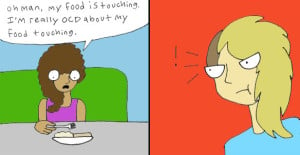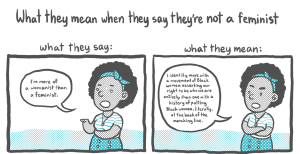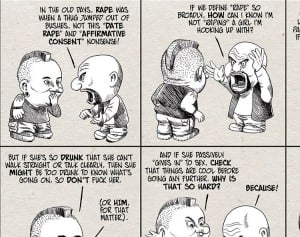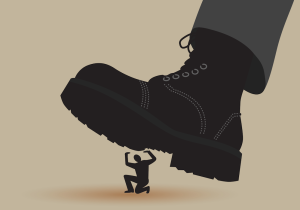Hi, my name is Dr. Lindsey Doe, and this is a sex education resource called Sexplanations.
The Centers for Disease Control and Prevention estimates that one in six boys and one in four girls are sexually abused before age 18, and the ratio increases to one in five men and one in two women with adulthood.
For other genders like trans, non-conforming, and genderqueer, the rates are as high as two in three who experience sexual abuse at some point in their lives. Here’s what these statistics look like in a group of 100 people – over a third of us.
I want you to know, victims don’t often disclose that they’ve been sexually abused right away or ever, they might not have the language to explain, or they have reluctance for all kinds of other reasons. Some of the biggies being fear the perpetrator might retaliate, fear of disrupting relationships, and fear no one will believe them so it’s absolutely imperative that we pay better attention to what isn’t being said.
The changes in behaviors and physical complaints that signal “I’m being sexually abused.” If you want, you can pause the video and grab scratch paper to record the symptoms you recognize. I’m listing the most common symptoms in children, adolescents, and adults, plus a rundown of signs someone is a sexual perpetrator.
If you haven’t spent a lot of time around kids, it can be hard to tell what’s normal and what’s not, like what’s a typical temper tantrum versus something that’s indicative of abuse. Sometimes the answer is the severity of the behavior other times it’s the frequency. Stopitnow.org has a great online help center to sort through your questions. A lot of the signs of sexual abuse I’m sharing with you are adapted from their website.
A child who’s been sexually abused may experience frequent nightmares and trouble sleeping, a sudden change in eating habits such as refusing to eat, loss or increase in appetite, and difficulty swallowing. Mood swings, rages, insecurity, clingy-ness, withdrawal, excessive crying, fear of new or unusual people and places are also signs of sexual abuse.
Same with the kiddo trying to be sexual with toys, pets, or other children. Provoking conversations about sex, drawing things that are sexual, telling sexual stories, and using new words for their genitals that you’re not sure how they learned. Fecal and urinary incontinence are also signs of sexual abuse – that’s when they can’t control it. There’s also resistance to getting undressed, saying “my body is dirty,” “bad,” or “ugly,” and difficulty walking or sitting.
A child who has been or is being sexually abused may not want to go home, may be overly compliant, watchful like something bad is going to happen, and distressed by flashbacks. You may notice sudden, unexplained gifts and money, mention of secrets, an older or special friend, and signs of other abuse like physical or verbal which often coincide with sexual abuse.
There may also be more obvious warning signs like injuries to their bodies, specifically their genitals and/or anus, urinary tract infections, STIs, pain and bleeding going to the bathroom, and blood, semen, or discharge on them.
The biggest sign to watch for are clues – intentional red flags that the kiddo puts up to test whether or not it’s safe to share more about the violence. When this happens, listen, repeat what they say back to them, and then in private, call the local child protection services hotline and/or police. All you have to do is report, they will determine what to do about it.
The behaviors more typically found in adolescents who have been sexually abused may include some or all of these. Self injury, inadequate personal hygiene, drug and alcohol abuse, sexual promiscuity, running away from home, trouble concentrating in school or truancy, skipping it all together.
Depression, anxiety, suicide attempts, fear of intimacy or closeness, compulsive eating or dieting, aggression, masturbating excessively or in public, sexual interest toward children, low gastrointestinal functioning, pregnancy, plus everything I already listed that younger children might exhibit. Children and adolescents who have been sexually abused are two to 13.7 times more likely to be victimized as adults than their peers.
Many of these warning signs carry over into adulthood. Other indicators an adult has been or is being sexually abused are sexual difficulties, loss of interest in sex or compulsive sexual behaviors, turmoil in close relationships, depression, anger, fear, especially when triggered by reminders of the abuse.
Uncertainty about one’s safety, neglect of house, job, children, and bank accounts. Trouble concentrating, struggling at school or work, feelings of guilt and shame, a negative self-image, sense of dirtiness, both inside and out, prevalent distrust of others, and emotional numbness.
This is a lot to think about, and these are only some of the most notable ways that people express abuse symptoms. Everybody is unique so there may be other signals I haven’t listed, or in the case of 40% of victims, there may be no signs at all. If you’re unsure what you’re witnessing, I will again and again recommend calling a hotline or the police for feedback. An additional strategy is to look out for suspicious behaviors and potential perpetrators.
Is there someone who generally makes others feel uncomfortable? Refuses to let people set their own limits, physically and socially? Insists on touching people even when it’s expressed as unwanted, walks in on people in bathrooms or their bedrooms, doesn’t have successful relationships with peers, is needy, possessive, abusive in other ways, controlling, and is a victim of child abuse themselves?
Is there someone who specifically with children, refers to sexual images and stories around them, exposes them to adult sexual interactions without concern, has secret or planned meet-ups with teens or little ones, exchanges unusually frequent calls, texts, and e-mails with kids? Is overly interested in the sexuality of a child or teen, interferes with the child’s dating life or talks about their appearance, gives children unexplained gifts or money, allows them to be sexually inappropriate with each other, and finally is too good to be true?
Trust that gut of yours – don’t wait for proof. Create a safety plan, call it in, and stay curious. Today specifically, I also want to say please share this video with everyone. The sooner you recognize and report signs of sexual abuse, the sooner we can stop it. Many people are sexually abused for years of their lives, and with your help, those years can instead be spent healing.
With all of my heart, I am asking you, please post this video on Facebook, Twitter, Tumblr, Reddit, and wherever else you can think of. Thank you.




















